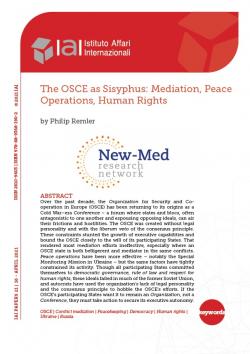The OSCE as Sisyphus: Mediation, Peace Operations, Human Rights
Over the past decade, the Organization for Security and Co-operation in Europe (OSCE) has been returning to its origins as a Cold War–era Conference – a forum where states and blocs, often antagonistic to one another and espousing opposing ideals, can air their frictions and hostilities. The OSCE was created without legal personality and with the liberum veto of the consensus principle. These constraints stunted the growth of executive capabilities and bound the OSCE closely to the will of its participating States. That rendered most mediation efforts ineffective, especially where an OSCE state is both belligerent and mediator in the same conflicts. Peace operations have been more effective – notably the Special Monitoring Mission in Ukraine – but the same factors have tightly constrained its activity. Though all participating States committed themselves to democratic governance, rule of law and respect for human rights, these ideals failed in much of the former Soviet Union, and autocrats have used the organisation’s lack of legal personality and the consensus principle to hobble the OSCE’s efforts. If the OSCE’s participating States want it to remain an Organization, not a Conference, they must take action to secure its executive autonomy.
Paper prepared in the context of the New-Med Research Network, April 2021.
-
Details
Rome, IAI, April 2021, 20 p. -
In:
-
Issue
21|16 -
ISBN/ISSN/DOI:
978-88-9368-190-2
Introduction
1. Mediation
2. Peace operations: The case of Ukraine
3. Democracy and human rights
Conclusion
List of acronyms
References



